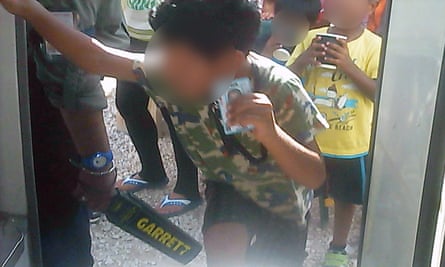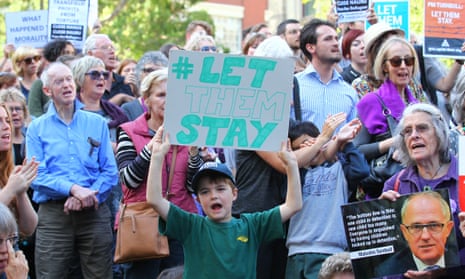Australia’s famously hardline refugee policies – in particular its practice of sending asylum seekers to remote foreign islands for processing and resettlement – are facing unprecedented pressure from widespread public protests and fracturing political support.
Thirty-seven babies born in Australia to asylum-seeker parents will be sent with their families to the Pacific island of Nauru as “illegal maritime arrivals”, the government has said, resolutely defending the offshore processing policy that it insists saves lives at sea.
The long-running debate has been brought to renewed prominence by a ruling in the high court that upheld the government’s constitutional right to build, fund and run offshore detention centres in foreign countries.
Australia’s two offshore detention centres – in remote Nauru and the Papua New Guinean island of Manus – have been the site of consistent reports of violence against asylum seekers, including the sexual assault of children, and the rape of men and women in detention, as well as other abuses such as detainees being given out-of-date food and expired medication.
Two men have died in offshore detention: one beaten to death in a riot and another after his removal to hospital with an infected leg wound was delayed.
Paediatricians have reported children as young as seven attempting suicide in Australian-run detention centres, and one father on Nauru reported his two-year-old boy played with cockroaches in detention “because he has no other toys”.
The high court ruling allows the government to move 267 asylum seekers to Nauru. Most have previously been held on Nauru, but were brought to Australia for their own, or a family member’s, medical treatment. Some are suffering cancer or terminal illnesses, parliament heard this week.
Thirty-seven of the 267 are babies who were born in Australia to mothers who are seeking asylum. A further 54 are children, several of whom attend Australian schools.
The Australian Human Rights Commission found that 95% of the children who had previously been held on Nauru were at risk of post-traumatic stress disorder, and said children must be removed from the “toxic detention environment, which is causing and/or exacerbating mental ill-health”.
Internal government documents obtained by the Guardian under freedom of information laws show people held in immigration detention have rates of severe mental distress nearly four times the general population in Australia, that children suffer more serious mental crises, and the damage to their mental health lasts longer after they are released.
The chief medical officer of the Australia Border Force, Dr John Brayley, told parliament this week: “The scientific evidence is that detention affects the mental state of children, it’s deleterious … wherever possible, children should not be in detention.”
Immigration minister Peter Dutton has promised he was “not going to send children back into harm’s way”, but the head of his department, Mike Pezzullo, told parliament this week that some asylum seekers whose medical situations had been resolved could be ready to be forcibly removed “within days”.
However, while offshore processing has previously enjoyed consistent bipartisan support, the removal of the 267 to Nauru has met with massive public opposition within Australia, and led to a fracturing of political support.
Rallies under the banner of #LetThemStay have been held across Australia, attracting thousands to protests. Ten Anglican and Uniting church leaders have defied the law, invoking ancient right of sanctuary in offering their churches as refuges for those facing removal to Nauru.

Doctors and detention centre workers, who risk two years in jail for speaking out about conditions in the camps, have spoken at public events and in media interviews, arguing that conditions in offshore detention amount to torture.
And five of six state premiers have pledged their states’ support for the position of Victoria’s Daniel Andrews, who wrote to the prime minister urging him not to remove the asylum seekers and offering to find homes for the 267 in his state.
“I write to inform you that Victoria will accept full responsibility for all of these children and their families, including the provision of housing, health, education, and welfare services,” he told the prime minister.
“Given we stand ready to provide a safe, secure and welcoming environment for these children and their families, there is no justification for their removal.”
But prime minister Malcolm Turnbull and immigration minister Dutton have said they would not be swayed from offshore processing.
The policy, they argue, removes the motivation for people to risk dangerous boat voyages to Australia, and robs people-smugglers of a product to sell to people seeking asylum.
“Anything we do which gives them a marketing opportunity they will use and they will use it to get more vulnerable people on boats and more children and their parents will die by drowning at sea,” Turnbull said.
The government says it believes up to 1,200 people drowned trying to reach Australia between the years 2007 and 2013, when, under Labor government policies, boats arrived in significantly higher numbers.
Dutton told ABC radio he wanted to be the minister who removed all children from detention – “and I will”.
There are far fewer children in detention now (91) than at the peak of child detention in July 2013, when 1,992 children were detained. Sixty-eight children currently live in the detention centre on Nauru and about 80 outside the detention buldings on that island.
However, although the numbers of children has fallen, they are held in detention for longer. The average time detained has jumped dramatically, from an average of 72 days in July 2013 to 445 days in January 2016.
Nearly a quarter – 23.5% – of people in immigration detention have been incarcerated for more than two years.
The future for the families who are removed to Nauru is unclear.
That country is refusing to permanently resettle any refugees, and Australia is seeking deals with “third countries” for permanent resettlement. So far, only Cambodia has accepted any refugees – just five – at a cost to Australian taxpayers of more than AU$55m (£27m).
Kyrgyzstan, the Philippines and Malaysia have all been mooted as possible resettlement countries.
Daniel Webb, from the Human Rights Law Centre, which brought the high court challenge to offshore detention, told the Guardian that “with the stroke of a pen” the 267 could be granted the right to stay in Australia by the immigration minister.
“The legality is complex but the morality is simple – it would be fundamentally wrong for the government to condemn these families to a life in limbo on Nauru.”

Comments (…)
Sign in or create your Guardian account to join the discussion